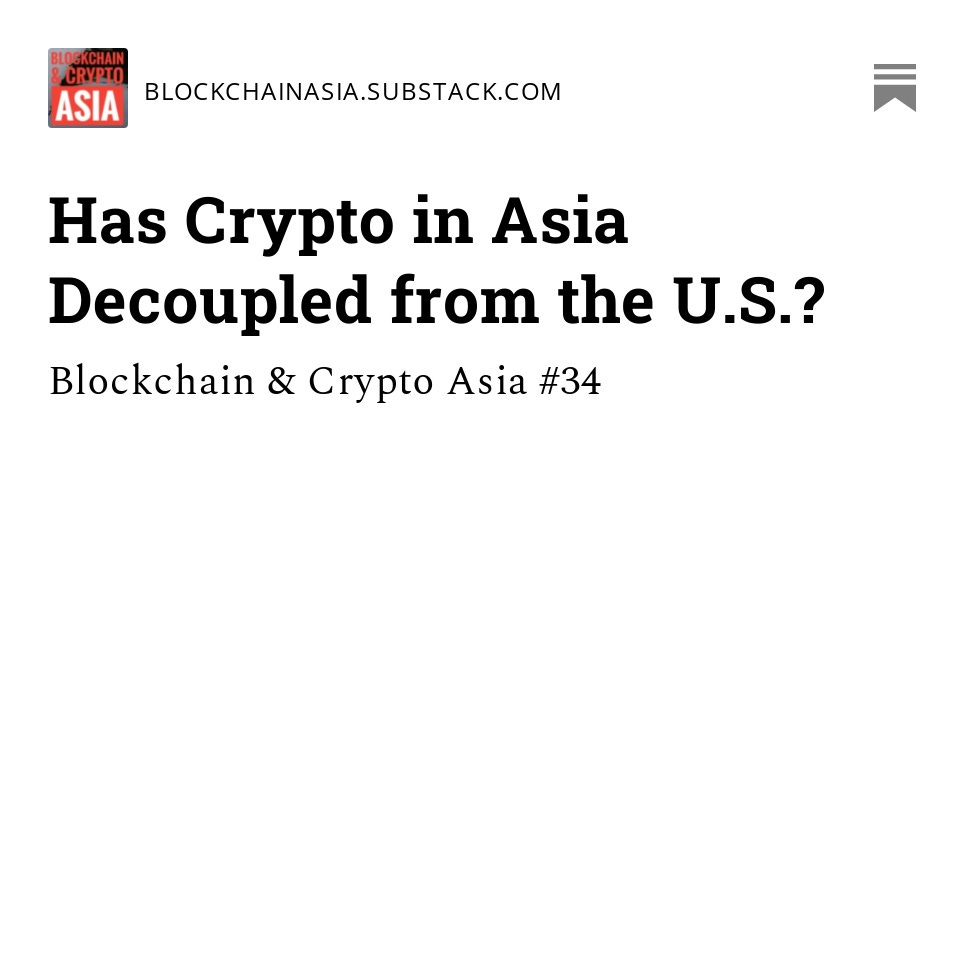Three years ago, I started this blog to track the developments of blockchain & crypto in Asia, believing that one would not see the whole ecosystem picture without knowing what is happening in the East. Three years later, the West and the East have increasingly diverged and moved in their own directions.
I want to start this issue of Blockchain & Crypto Asia with a quotation from Ian, Co-founder of Syndicate, “Hearing from multiple sources that sentiment and activity in crypto in Asia have decoupled from the U.S.” I am Coco. Welcome back.
While the U.S. government and regulators are still being consumed by shocks and anger from the FTX debacle, those in Asian countries have not slowed down. It is refreshing to hear the Japanese Prime Minister and other politicians discuss in the House of Representatives how Web3 can help with its economy. Don’t forget that Japan was the victim of Mr. Gox and Coincheck. Hong Kong has launched Asia’s first BTC and ETH futures ETFs. Will spot ETFs come next? In addition, both Hong Kong and Singapore are working on the creation of a regulatory framework for stablecoins. They may beat the U.S. in implementing it. Japan may launch its own stablecoins.
Read on.
Binance temporarily suspends USD deposits and withdrawals through banks due to the difficulty of finding US banking partners to facilitate transactions of cryptocurrencies. Binance has not reported going through the same challenge with other fiat currencies.


Binance has taken a majority stake in South Korean troubled exchange GOPAX, whose parent company Streami is one of the ten largest creditors of Genesis Global. DCG is the second-largest shareholder of GOPAX.
Japanese politicians discuss Web3 in the House of Representatives and explain why it is important to Japan.
The first half of the speeches delivered at the House of Representatives by member Masaaki Taira and Prime Minister of Japan Fumio Kishida covers the topics of NFTs, DAOs, and Cybersecurity.
After briefly explaining what Web3 was, they ask those who still do not fully understand it to do research with Google. They emphasize the importance of NFTs, which they believe can help Japan’s regional revitalization policy ( the national strategy in Japan to curb population imbalances, which also includes reviving rural economies) and build a “Cool Japan” (an initiative to further strengthen the ties between Japan and other countries in such areas as economics, culture, and diplomacy).
Masaaki Taira points out that, in spite of the crypto winter and the scandal in the U.S., it is an exciting time. He is not interested in the ups and downs of crypto asset prices but is focused on the NFT function that blockchain technology enables.
In addition, Japan is working on the yen stablecoin that can be used around the world and looking into legislating DAOs so that they can be used properly.
The Japanese government has set up a Web3 study group, which compiled a research report last year. The government is also considering setting up a consultation desk to address the concerns and challenges local governments and business operators may have.
Japan urges global counterparts to regulate crypto like banks. At the same time, its regulator points out, “what’s brought about the latest scandal (FTX) isn’t crypto technology itself. It is loose governance, lax internal controls and the absence of regulation and supervision.” Japan’s crypto industry went through two disasters, first Mt. Gox in 2014 and Coincheck in 2018. Japan has learned its lessons from them.
I want to include a post by Marieke Flament of NEAR, who shares her insights about Japan.
Hong Kong’s central bank Hong Kong Monetary Authority (HKMA) plans to introduce a regulatory framework for stablecoins and the implementation in 2023/24.
HKMA published a research paper in January 2022 and invited industry experts to provide comments and feedback. The conclusion of the discussion is that stablecoins (virtual currencies backed by fiat) would be the first priority given their greater potential for use as alternatives to fiat in payments, and hence present a more imminent risk to the territory’s monetary and financial stability. It is expected that stablecoins based on arbitrage or algorithms will not be able to get licenses in Hong Kong. More insight here
After Asia’s first BTC and ETH futures ETFs were launched on HKEX, Samsung’s asset management arm launched a Bitcoin futures ETF on a member exchange of HKEX.
TRM’s report on Singapore does a good job to look back at what happened in 2022 and predict what is ahead in 2023. 2022: A Roaring Year for Digital Assets in Singapore
Singapore is expected to put together a regulatory framework for stablecoins, just as HKMA is doing.
Echoing the stance of Mainland China, Singapore will emphasize the importance of blockchain technology, while downplaying cryptocurrency.
In the innovative blockchain, crypto & digital asset ecosystem, Asia is the other side of the coin. Blockchain & Crypto Asia, which covers exclusively blockchain and crypto & digital asset developments in Asia, including regulation, investments, and company highlights, helps you stay on top of what is going on in the Far East. The curated content is selective and serves as information and personal views only, not investment advice.
I am the co-founder of Kee Global Advisors. Please email me with any ideas or thoughts. I’d love to hear from you! You can also follow me on Linkedin and Twitter.





